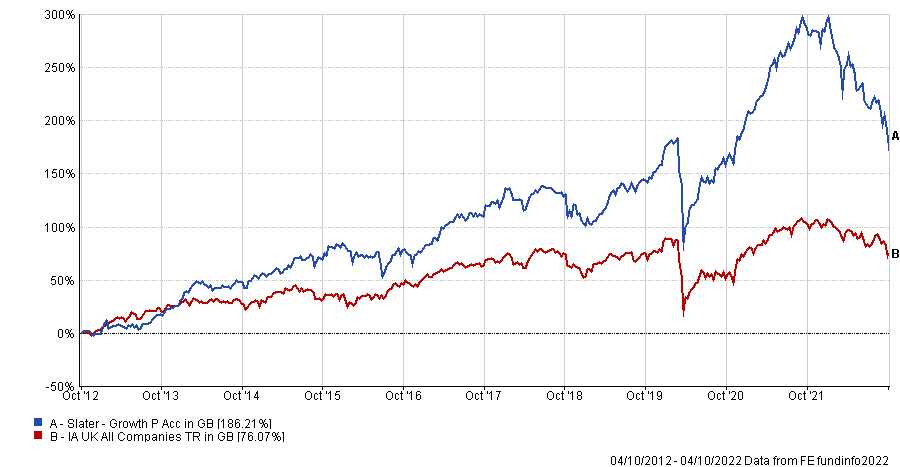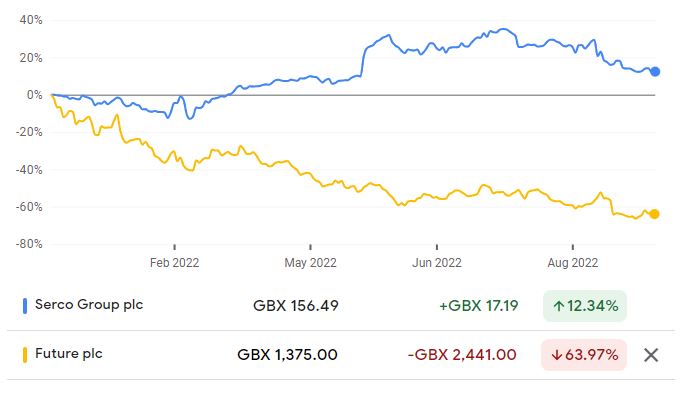The three best performing funds in the IA UK All Companies sector over the past decade all belonged to Slater Investments with the largest, Slater Growth, charging ahead of its peers with a total return of 186.2%. However, it has suffered from the market rotation like so many growth funds this year.
Returns are down 27.1% since the start of the year and the fund has dropped to the bottom quartile over the past six months, but Mark Slater is unfazed.
Here, he tells Trustnet how many UK assets are reporting strong revenues despite declining share prices, why getting frustrated at investors selling during down markets is akin to finding rain annoying, and what impact the mini-Budget had on pension funds.
Total return of fund vs sector over the past decade

Source: FE Analytics
What is your investment process?
We’re looking for dynamic growth businesses across the market-cap spectrum and we’re looking to buy them cheaply.
Our primary measure for that is by comparing the P/EG [price-to-earnings growth] with the growth rate and also by looking at the degree to which profit has turned into cash.
It's an extremely protective way of assessing that profits are real and we can eliminate about 95% of the market using those screens.
In a nutshell, we're trying to find the best growth and the best value, but I think these labels can really confuse people.
What is the split between growth and value in your portfolio?
There is no distinction to me. I’d say a value company is a decent business with good growth prospects you can buy cheaply.
You could argue we're buying growth with value filters but we're not buying things that are growing incredibly fast on very high multiples. We're not doing that and we’ve never done that.
How has it been investing this year?
When things are on sale you try and buy them, but it's a very unforgiving market at the moment.
It's interesting actually because we didn't really understand our numbers this year – in all previous bear markets, we've significantly outperformed afterwards.
This time around, there's been much more underperformance upfront, so we've taken a lot of pain early which is unusual.
It's a tough market for anyone outside the main index at the moment, but it does mean that the things we own are getting incredibly cheap, so it's an interesting environment to be in to have liquidity and to be looking for things to buy.
Has the market downturn been damaging to the fund’s assets?
A lot of the businesses we own are in areas that have historically been impacted by recessions, but I don't believe that will be the case. In recessions, people don't just do nothing. They spend less, but they also change the way they spend.
They will come out of this much stronger, but people’s default on leisure hospitality is ‘forget it’.
The same applies to other areas as well, like in the media space – marketing, for example, has historically been destroyed in recession.
And there are a whole lot of other businesses which have also been de-rated, which will not be affected at all.
How has the portfolio changed this year?
Not massively – we bought one company, we sold two companies, then added a lot to our existing holdings. Brewin Dolphin and Clinigen were sold and we added a new holding in a company called CentralNic.
Did the mini budget and Bank of England intervention have an impact on the fund?
It was a surprise, but I think there's a problem in every single European market however you wrap it up. It's going to be very hard to avoid recession in every market and I don't think the mini-Budget changed a great deal.
It may have accelerated certain things, but I think the main issue is the government losing credibility with the market.
There was just no liquidity because of the gilt market and a whole lot of pension funds very stupidly held liability-driven investments.
Every company we ever see with a pension fund, we tell them not to do it because it’s moronically stupid to hold LDI and now they’ve realised it is dangerous.
What was your best performing stock this year?
Most things are negative but one or two are positive – Serco is probably the most positive. That's given us about 1% contribution year-to-date, but most companies are negative.
We came into it at a very good time because it had supernormal profits during Covid and people didn’t like that because they knew it would end.
Our analysis completely excluded Covid profits because underneath it all there’s a very nice growth rate in that business and it is very cash generative.
What was your biggest detractor from performance?
Companies such as Future and Next Fifteen had a big negative impact but did nothing wrong – they didn’t deserve those de-ratings.
Future is a media company and consumer brand, so people think, ‘oh my God I have to run’, but the sell-off is no more sophisticated than that. The market is assuming a recession but there’s no evidence that it will suffer from one.
Share price of Serco and Future in 2022
Source: Google Finance
How have you dealt with declining investor sentiment in UK equities?
A lot of money entered the fund at the end of last year and some of that has since exited but we’ve got a lot of liquidity and we were able to handle it quite straightforwardly.
We have to reassure investors that this has happened before and it’s normal. It’s a very unpleasant price you pay for good times that come later. For us, we have to stay focused on the businesses we own and not the share prices.
The average fund investor is emotional – they react to what they see in the papers and they can’t take the pain.
Some people have seen this happen before, they hold their nerve and those are the investors that do best. Over long periods of time, they’ll do a lot better than those that a more skittish.
It’s a bit frustrating but there’s nothing you can do about it. It’s like finding rain annoying – there’s no point. It’s going to happen anyway.
What are your interests outside of work?
I like tennis – I’m not very good at it but I enjoy playing it. I do it mostly for fitness.





